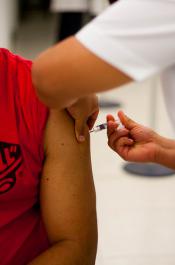Scientists are working on vaccines that spread like a disease. What could possibly go wrong?
By Filippa Lentzos, Guy Reeves,
Bulletin of the Atomic Scientists
| 09. 18. 2020
Once a COVID-19 vaccine is approved for public use, officials around the world will face the monumental challenge of vaccinating billions of people, a logistical operation rife with thorny ethical questions. What if instead of orchestrating complicated and resource-intensive campaigns to vaccinate humans against emerging infectious diseases like COVID-19, we could instead stop the zoonotic diseases that sometimes leap from animals to people at their source? A small, but growing number of scientists think it’s possible to exploit the self-propagating properties of viruses and use them to spread immunity instead of disease. Can we beat viruses like SARS-CoV-2, the novel coronavirus, at their own game?
A virus that confers immunity throughout an animal population as it spreads in the wild could theoretically stop a zoonotic spillover event from happening, snuffing out the spark that could ignite the next pandemic. If the wild rats that host the deadly Lassa virus, for example, are vaccinated, the risks of a future outbreak among humans could be reduced. For at least 20 years, scientists have been experimenting with such self-spreading vaccines, work that continues...
Related Articles
By Mary Annette Pember, ICT News [cites CGS' Katie Hasson] | 04.18.2025
The sight of a room full of human cadavers can be off-putting for some, but not for Haley Omeasoo.
In fact, Omeasoo’s comfort level and lack of squeamishness convinced her to pursue studies in forensics and how DNA can be...
Gray wolf by Jessica Eirich via Unsplash
“I’m not a scarcity guy, I’m an abundance guy”
– Colossal co-founder and CEO Ben Lamm, The New Yorker, 4/14/25
Even the most casual consumers of news will have seen the run of recent headlines featuring the company Colossal Biosciences. On March 4, they announced with great fanfare the world’s first-ever woolly mice, as a first step toward creating a woolly mammoth. Then they topped that on April 7 by unveiling one...
By Katrina Northrop, The Washington Post | 04.06.2025
photo via Wikimedia Commons licensed under CC by 3.0
China's most infamous scientist is attempting a comeback. He Jiankui, who went to jail for three years after claiming he had created the world's first genetically altered babies, says he remains...
By Anumita Kaur [cites CGS’ Katie Hasson], The Washington Post | 03.25.2025
Genetic information company 23andMe has said that it is headed to bankruptcy court, raising questions for what happens to the DNA shared by millions of people with the company via saliva test kits.
Sunday’s announcement clears the way for a new...




